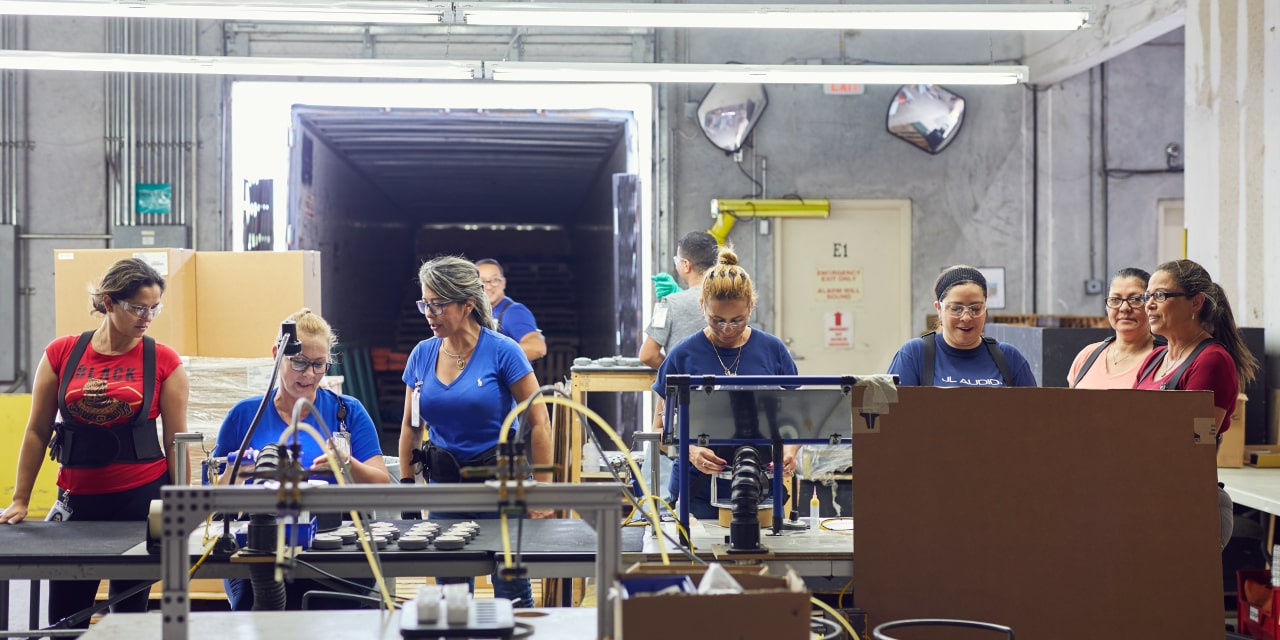Brookfield's Manufacturing Investment Plans Affected By US Tariffs

Table of Contents
Increased Manufacturing Costs Due to Tariffs
The imposition of US tariffs has led to a substantial increase in manufacturing costs for Brookfield. This increase stems from two primary sources: the rising cost of imported raw materials and the inflated prices of imported equipment.
Impact on Raw Materials
Tariffs on imported raw materials are directly increasing production costs across Brookfield's manufacturing facilities. This is impacting profitability and competitiveness.
- Examples: Steel, aluminum, certain plastics, and specific chemical compounds essential for various manufacturing processes have experienced significant price hikes due to tariffs.
- Percentage Increase: Estimates suggest a 15-25% increase in the cost of some key raw materials depending on the specific product and origin. This variability necessitates careful cost analysis and sourcing strategies.
- Sourcing Challenges: Brookfield, like many manufacturers, is facing challenges in sourcing alternative suppliers to avoid the tariff impact. This often involves compromises on quality, delivery times, or both. The search for alternative, tariff-free sources may also increase transportation costs.
Higher Prices for Imported Equipment
The cost of importing specialized machinery and equipment crucial for Brookfield's manufacturing operations has also risen sharply due to tariffs. This affects both expansion plans and necessary upgrades.
- Examples: High-tech robotics, advanced processing equipment, and precision tools are frequently imported and are now subject to increased tariffs.
- Pre- and Post-Tariff Price Comparisons: Industry reports indicate a price increase ranging from 10% to 30% on some imported equipment, depending on the origin and type.
- Procurement Delays: The added complexity and costs associated with importing equipment can lead to significant delays in Brookfield’s capacity expansion and technological upgrade projects. This delay directly impacts the company’s ability to meet market demands.
Supply Chain Disruptions and Delays
Beyond increased costs, US tariffs are creating significant disruptions and delays throughout Brookfield's global supply chains.
Logistics and Transportation Costs
Tariffs have dramatically increased logistics and transportation costs, impacting every stage of the supply chain.
- Increased Freight Rates: Shipping costs have risen substantially due to increased tariffs on transportation services and higher demand for alternative shipping routes.
- Potential Port Congestion: Increased inspections and customs procedures related to tariffs can lead to port congestion, further delaying shipments and increasing costs.
- Relying on More Expensive Routes: Companies are forced to seek more expensive, less efficient shipping routes to avoid tariffs, further increasing transportation costs. This may also lead to longer delivery times.
Restructuring of Supply Chains
In response to tariff-related disruptions, Brookfield is exploring options to restructure its supply chains, potentially through reshoring or nearshoring.
- Challenges and Costs: Relocating manufacturing operations involves substantial costs, including setting up new facilities, training new employees, and establishing new logistical networks. Finding reliable, high-quality suppliers in new locations also presents a significant challenge.
- Long-Term Implications: The long-term implications of reshoring or nearshoring include alterations to Brookfield’s manufacturing strategy and its global footprint. This may involve re-evaluating the cost-benefit analysis of production in different countries.
Impact on Investment Decisions and Future Plans
The cumulative effects of increased costs and supply chain disruptions are significantly impacting Brookfield's investment decisions.
Delayed or Cancelled Projects
The uncertainty and increased financial burden associated with tariffs have led Brookfield to delay or even cancel some manufacturing projects and expansions.
- Specific Examples: While Brookfield may not publicly disclose all impacted projects, analysts predict delays in several planned facility expansions and potential reductions in capital expenditure.
- Financial Implications: The financial implications of delayed or cancelled projects can be substantial, including lost revenue opportunities, reduced market share, and potential job losses in affected regions.
- Job Losses: Delays or cancellations may result in reduced hiring or even layoffs, particularly in areas where the impacted projects were intended to create jobs.
Shifting Investment Priorities
Brookfield is likely adjusting its investment priorities to mitigate the impact of tariffs. This may involve investments in technologies to increase efficiency and reduce reliance on imported goods.
- Automation and Technology Upgrades: Investing in automation technologies can potentially reduce reliance on imported labor and components, improving efficiency and reducing overall costs.
- Alternative Manufacturing Strategies: Brookfield may explore alternative manufacturing strategies such as additive manufacturing (3D printing) to reduce dependence on traditional supply chains.
- Market Diversification: Diversifying into product lines or markets less affected by tariffs can provide resilience against future trade policy changes.
Conclusion
The impact of US tariffs on Brookfield’s manufacturing investments is substantial, resulting in increased manufacturing costs, widespread supply chain disruptions, and significant adjustments to investment strategies. These challenges highlight the broader implications of trade policy on the manufacturing sector and the global economy. Brookfield's response demonstrates the adaptive strategies businesses must undertake to navigate the complexities of international trade. Understanding the impact of US tariffs on Brookfield’s manufacturing investments is crucial for anyone invested in the company, and for anyone seeking to understand the intricate complexities of global trade and its effects on business. Stay informed about Brookfield’s response to trade challenges by following their investor relations materials and industry news. Learn more about the future of Brookfield’s manufacturing strategies and the broader implications of trade policy on global businesses.

Featured Posts
-
 New Lawsuit Targets Epic Games Fortnite In Game Store Operations
May 03, 2025
New Lawsuit Targets Epic Games Fortnite In Game Store Operations
May 03, 2025 -
 Mp Conduct Sparks Mass Resignation Of Reform Uk Branch Officers
May 03, 2025
Mp Conduct Sparks Mass Resignation Of Reform Uk Branch Officers
May 03, 2025 -
 Euro 2025 Three Key Questions For Sarina Wiegman And The England Team
May 03, 2025
Euro 2025 Three Key Questions For Sarina Wiegman And The England Team
May 03, 2025 -
 Russell T Davies On Doctor Whos Future A Potential Hiatus
May 03, 2025
Russell T Davies On Doctor Whos Future A Potential Hiatus
May 03, 2025 -
 Billetterie La Seine Musicale Saison 2025 2026
May 03, 2025
Billetterie La Seine Musicale Saison 2025 2026
May 03, 2025
